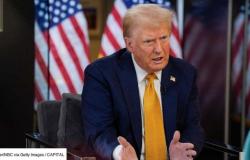The former boss of the French far right and the founder of the National Front, the former name of the National Rally, died this Tuesday, January 7 at the age of 96. His links with the lands of Provence-Alpes-Côte d’Azur are numerous, he even dreamed of becoming the president of the Region.
The essentials of the day: our exclusive selection
Every day, our editorial team reserves the best regional news for you. A selection just for you, to stay in touch with your regions.
France Télévisions uses your email address to send you the newsletter “The essentials of the day: our exclusive selection”. You can unsubscribe at any time via the link at the bottom of this newsletter. Our privacy policy
“Jean-Marie Le Pen, surrounded by his family, was called back to God this Tuesday at noon”this is how his family announced the disappearance of the politician, in a press release sent to AFP. Jean-Marie Le Pen died this Tuesday, January 7 at the age of 96, in Garches (Hauts-de-Seine), in an establishment, where he was admitted on November 11.
Breton by birth, Jean-Marie Le Pen led a large part of his political career in Paris, but from the 1980s, his speech attracted a growing electorate in Paca. Long in ambush, the founder of the National Front achieved his best scores there. Jean-Marie Le Pen will make the South-East a frontist bastion, but he will never achieve his objectives. France 3 Provence-Alpes looks back on 10 dates which marked its political battles in Paca.
June 18, 1984: his first breakthrough in Paca
In the early years of the National Front, created in 1972, Jean-Marie Le Pen mainly tried to make a name for himself in Paris. We had to wait around ten years and the Europeans of June 18, 1984 to see a first major frontist breakthrough in Provence-Alpes Côte d’Azur. The daily Libération headlines: “Le Pen’s breakthrough, collapse of the PC, SHOCK”.
In this region, marked by strong social inequalities, Jean-Marie Le Pen’s speech on insecurity and immigration finds a favorable response. Although it achieves nearly 11% at the national level, Jean-Marie Le Pen’s party achieves much higher scores in the south-east, from 17 to 22%, in the Alpes-Maritimes, Bouches-du-Rhône, the Var, and the Vaucluse.
In Marseille, a left-wing city then held by Gaston Defferre, the FN obtained 21.42% of the votes, ahead of the PS (18.42%).
March 21, 1986: the agreement with Jean-Claude Gaudin
Throughout the elections, Jean-Marie Le Pen confirms his dynamic in the south of France. In 1986, thanks to proportional representation, the FN had eight deputies in Paca, including four in Bouches-du-Rhône and 25 seats in the region. The UDF Jean-Claude Gaudin makes an agreement with the FN to win the presidency of the regional council against the outgoing socialist Michel Pezet.
“I did not want to be hostage to the PS, Jean-Claude Gaudin would defend himself years later. And, in Marseille, Le Pen’s men, I knew them by heart: they all came from the right.”
April 24, 1988: in conquest on the lands of Defferre
During the first round of the presidential election on April 24, 1988, it was in Paca that Jean-Marie Le Pen achieved his best national scores. Particularly in Marseille. He obtained 28.33% ahead of Mitterrand, Chirac and Barre. From then on, the second city in France appeared to carry ballot boxes.
The former para therefore decides to parachute into the legislative elections. The president of the National Front is running in the 8th constituency of Bouches-du-Rhône. He advanced to the second round duel, but lost by 43.57% of the votes to 56.43% against the socialist Marius Masse.
March 22, 1992: elected to the region in the Alpes-Maritimes
This failure of 1988 did not stop Jean-Marie Le Pen, who was charting his course in Paca. On March 22, 1992, he won a good result as head of the list in the regional elections, with 34 councilors elected against 15 in the outgoing council. His list follows that of the UDF, but without reaching the “breaking wave” that he dreamed of. He was elected in the 3rd constituency of Alpes-Maritimes, in the constituency of Nice which is the most favorable to the National Front and where he is running for mayor (after the flight to Uruguay of Jacques Médecin). Jean-Marie Le Pen joins the Paca regional council, with 34 councilors. The founder of the FN will have nearly 13 years in office there until 2015.
March 28, 1993: failure in the legislative elections
Building on these good results, and his failure in 1988 in Marseille, the frontist leader tried his luck once again in the 1993 legislative elections in the Alpes-Maritimes. He sets his sights on the 3rd constituency, that of Nice, which offers him his best national scores. But success was still not there on March 28. At 64, he failed again in the second round (42.06%) against Rudy Salles (57.94%), outgoing PR deputy and UPF candidate. Lhe leader of the National Front sees the southeast as a springboard for the presidential election.
June 18, 1995: Toulon, Marignane and Orange in the FN purse
The following years were prosperous years for the FN which continued its conquest in the south. In the municipal elections on June 18, 1995, he won three town halls in the region with Jean-Marie Le Chevallier in Toulon, Daniel Simonpieri in Marignane and Jacques Bompard in Orange.
February 9, 1997: Vitrolles, fourth FN town hall
On February 9, 1997, another town hall in Bouches-du-Rhône, Vitrolles, also fell into the hands of the FN. It is Catherine Mégret, the wife of Bruno Mégret, number 2 in Jean-Marie Le Pen’s party, who is elected with 52.48% of the votes, replacing her husband, who was ineligible for one year. for overspending in the 1995 elections.
This is the first time that the FN has won a municipality, not thanks to a triangular one like for Toulon, Marignane and Orange, but in a direct duel, which results in an absolute majority.
August 24, 1998: the split with Megret
The FN summer university which opened on August 24, 1998 brought to light the rivalries between Bruno Mégret and Jean-Marie Le Pen. When the latter is sentenced to two years of ineligibility, he entrusts the reins of the party to his wife Jany. to lead the Europeans. Bruno Mégret breaks up with the chef. Bruno Mégret took many executives with him to found the National Movement. The crisis has severe immediate repercussions for the FN.
The following year, in the European elections of June 1999, the Frontist party fell to 5.69% of the vote, and lost half of its seats in the European Parliament. However, the FN remains strong in Paca.
March 28, 2004: the missed appointment in Paca
In the 2002 presidential election, candidate Jean-Marie Le Pen came first in the region with 23.38% of the vote. Jean-Marie Le Pen dreams of himself as regional president if he cannot preside over France. But he made a rookie mistake, he was not domiciled in Nice where he wanted to run and found himself ineligible for the regional elections on March 21 and 28, 2004.
In the 2010 regional elections, Jean-Marie Le Pen created a surprise in Paca where he was once again head of the list, collecting a score much higher than that predicted by the polls: 20.29% in the first round (compared to 11% in the national level), this is 7 points more than the pre-election estimates. With 22%, he even ranks second in the Alpes-Maritimes, ahead of the PS candidate. The National Front that the President of the Republic said was dead has been resurrected. However, Provence Alpes Côte d’Azur remains out of reach of the frontist leader.
August 20, 2015: excluded from his party
Ousted from the presidency of the FN in 2011, relegated to the role of honorary president, Jean-Marie Le Pen was excluded on August 20, 2015 from the party he founded, by his daughter Marine because of his slippages in the chambers. gas, “detail” of the Second World War.
However, in 2015, at the age of 87, he still planned to be head of the list for the regional Paca, before joining his granddaughter Marion Maréchal Le Pen. After three years of legal proceedings, Jean-Marie Le Pen was finally excluded from the party by judgment of the Versailles Court of Appeal in 2018. He also saw himself withdrawn from the honorary presidency in the process. After 14 years in the European Parliament, the former frontist leader lost his last mandate won in the South East.






